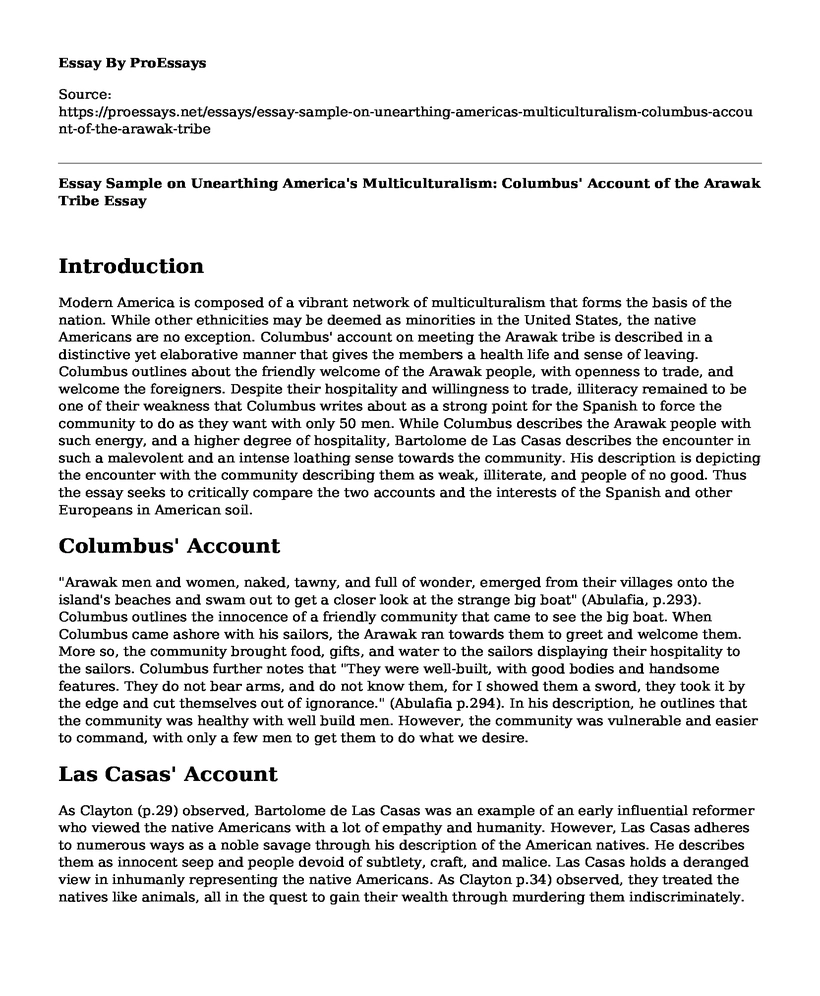Introduction
Modern America is composed of a vibrant network of multiculturalism that forms the basis of the nation. While other ethnicities may be deemed as minorities in the United States, the native Americans are no exception. Columbus' account on meeting the Arawak tribe is described in a distinctive yet elaborative manner that gives the members a health life and sense of leaving. Columbus outlines about the friendly welcome of the Arawak people, with openness to trade, and welcome the foreigners. Despite their hospitality and willingness to trade, illiteracy remained to be one of their weakness that Columbus writes about as a strong point for the Spanish to force the community to do as they want with only 50 men. While Columbus describes the Arawak people with such energy, and a higher degree of hospitality, Bartolome de Las Casas describes the encounter in such a malevolent and an intense loathing sense towards the community. His description is depicting the encounter with the community describing them as weak, illiterate, and people of no good. Thus the essay seeks to critically compare the two accounts and the interests of the Spanish and other Europeans in American soil.
Columbus' Account
"Arawak men and women, naked, tawny, and full of wonder, emerged from their villages onto the island's beaches and swam out to get a closer look at the strange big boat" (Abulafia, p.293). Columbus outlines the innocence of a friendly community that came to see the big boat. When Columbus came ashore with his sailors, the Arawak ran towards them to greet and welcome them. More so, the community brought food, gifts, and water to the sailors displaying their hospitality to the sailors. Columbus further notes that "They were well-built, with good bodies and handsome features. They do not bear arms, and do not know them, for I showed them a sword, they took it by the edge and cut themselves out of ignorance." (Abulafia p.294). In his description, he outlines that the community was healthy with well build men. However, the community was vulnerable and easier to command, with only a few men to get them to do what we desire.
Las Casas' Account
As Clayton (p.29) observed, Bartolome de Las Casas was an example of an early influential reformer who viewed the native Americans with a lot of empathy and humanity. However, Las Casas adheres to numerous ways as a noble savage through his description of the American natives. He describes them as innocent seep and people devoid of subtlety, craft, and malice. Las Casas holds a deranged view in inhumanly representing the native Americans. As Clayton p.34) observed, they treated the natives like animals, all in the quest to gain their wealth through murdering them indiscriminately.
The Interest of the Spanish and Other Europeans in the Americas
The main objective of the Spanish and the other European nations was geared by the quest to gain the wealth of the natives. Columbus persuaded the King of Spain to fund the expedition, and thus the king expected positive feedback from the expedition. As a result, Columbus acknowledges that the community can be subjected to any force to help push to adhere to the Spanish demands. As a result, this depicted the negative side of the Spanish and their motive towards the expedition. Additionally, Las Casas' observation also affirms the move of the European nations on the need to exploit and kill the natives to gain their wealth illegally. Most of these activities resulted in the killing of the native Americans since their weapons were no match to the Spanish or the other European nations.
Works Cited
Abulafia, David. "Neolithic meets Medieval: First Encounters in the Canary Islands." Medieval Ethnographies. Routledge, 2017. 291-314.doi. 10.4324/9781315249292-10
Clayton, Lawrence A. "Why nobody likes a prophet: Bartolome de las Casas, a loud voice in the wilderness." Cogent Arts & Humanities 3.1 (2016): 1124480.doi.10.1080/23311983.2015.1124480
Cite this page
Essay Sample on Unearthing America's Multiculturalism: Columbus' Account of the Arawak Tribe. (2023, Apr 23). Retrieved from https://proessays.net/essays/essay-sample-on-unearthing-americas-multiculturalism-columbus-account-of-the-arawak-tribe
If you are the original author of this essay and no longer wish to have it published on the ProEssays website, please click below to request its removal:
- Marxism in the Garden Party Essay
- Role of Law, Policy, and Evidence in Developing a Local Plan - Paper Example
- Research Paper on Climate-Change Policies for Low Carbon Transition
- Essay Example on the Future of Community Policing: A Comprehensive Analysis
- Request for Extension: TESU Student Policy Explained - Essay Sample
- Hidden Powers Behind the US Government: Who Has the Most Influence? - Essay Sample
- Essay Example on US Foreign Policy: Debates on Congress & President's Roles







